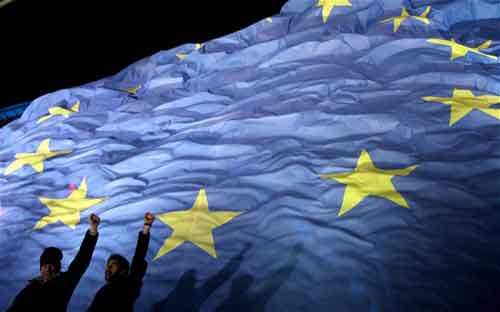 |
| 法國人承認他們是歐洲大陸上最傲慢的民族,而希臘人評價自己為“最值得信賴”。 |
|
All Europeans think that their own country is the most compassionate, and nearly everyone judges the Germans to be the least compassionate, although both France and Germany gave that title to Britain. But a few eyebrows will be raised by an authoritative new survey’s findings that the French agree they are the continent’s most arrogant people and that the Greeks rate themselves as the most trustworthy. The Washington DC-based Pew Research Centre polled more than 7,600 people in eight European countries about their attitudes towards the EU, their governments and their neighbours. The findings throw up intriguing insights into new national stereotypes in the wake of the Eurozone crisis, which has seen Germany take a leading role in imposing unpopular austerity measures on the struggling economies of southern Europe. Everyone, including the British, agreed that the Germans were the most trustworthy people in the EU, apart from the Greeks, who awarded themselves that accolade. The traditional antagonism between the UK and France is reflected in the survey, with Britons judging their neighbours over the Channel to be the least trustworthy and the most arrogant. The poll highlighted an internal conflict among the French, who considered themselves to be both the least arrogant and the most arrogant country in Europe. All Europeans think that their own country is the most compassionate, and nearly everyone judges the Germans to be the least compassionate, although both France and Germany gave that title to Britain. Nigel Farage, the leader of the UK Independence Party, welcomed the findings, joking: “I am delighted that the Eurocrats have failed to crush national stereotyping, which is what makes Europe a great continent.” The Pew report – which was based on surveys carried out in Britain, France, Germany, Italy, Spain, Greece, Poland and the Czech Republic – concluded that the European Union was “the new sick man of Europe”. The proportion of Europeans with a favourable view of the EU has plunged from 60 per cent last year to 45 per cent now. The UK may be considered the most Eurosceptic country, but its support for the union has barely changed in the past 12 months, slipping only two points to 43 per cent. By contrast, France’s backing for the EU has slipped dramatically, from 60 per cent last year to 41 per cent today. On the politically charged question of whether to remain in the EU, Britons are split evenly, with 46 per cent wanting to leave the union and the same percentage wanting to stay. The Pew report’s authors said: “The prolonged economic crisis has created centrifugal forces that are pulling European public opinion apart, separating the French from the Germans and the Germans from everyone else.” They added: "The effort over the past half century to create a more united Europe is now the principal casualty of the euro crisis. The European project now stands in disrepute across much of Europe.” The only European leader rated highly by their own voters was the German Chancellor Angela Merkel, who received a 74 per cent approval rating. Prime Minister David Cameron was next highest with a positive score of 37 per cent among the British public, although he can take some comfort from the fact that 58 per cent of Poles and half of all French people think he is doing a good job. Despite the gloomy economic outlook and growing disillusionment with the EU, there were strong majorities of more than 60 per cent in favour of keeping the Euro in the five countries polled that use the single currency. |
所有歐洲人都認為自己的民族是最富有同情心的,而幾乎每一個歐洲人都評價德國人最冷漠。盡管在法國人和德國人眼中,“最冷漠”這個稱號應該頒給英國。 但最近一項權威調查的結果可能會讓少數一些人大跌眼鏡——法國人承認他們是歐洲大陸上最傲慢的民族,而希臘人評價自己為“最值得信賴”。 位于華盛頓特區的皮尤研究中心(Pew Research Centre)對八個歐洲國家、超過7,600位民眾進行民意檢測,就歐盟、本國政府及鄰國問題詢問了他們的態度。 調查結果為研究新的國家印象提供了有趣的視角,這種新的印象是在歐元流通區產生危機后新出現的。在這場危機的中,面對南歐窘迫的經濟狀況,德國人一直帶頭實施著不受歡迎的貨幣緊縮政策。 除了希臘人以外,包括英國人在內的每一個歐洲人,都贊同日耳曼民族是最值得信賴的民族。在這一點上希臘人無疑使自己處在了一個尷尬的境地,因為他們之前把這個殊榮頒給了自己。 英國與法國之間長久以來的敵對情緒在這次調查中也有所體現——英國人評價他們這位隔海相望的鄰國“最不可信賴”和“最自大”。該調查突出了法國的內部矛盾——法國民眾評價自己既“傲慢”又“謙遜”。 所有歐洲人都認為自己的民族是最富有同情心的,而幾乎每一個歐洲人都評價德國人最冷漠。盡管在法國人和德國人眼中,“最冷漠”這個稱號應該頒給英國。 英國獨立黨領導人奈吉爾 法拉奇(Nigel Farage)高興地接受了這些調查結果,并調侃道:“我很高興看到歐共體并沒有瓦解歐洲各國給人留下的刻板印象,畢竟正是這些造就了一個個偉大的民族。” 皮尤研究中心的報告結論是根據在英國、法國、德國、意大利、西班牙、希臘、波蘭和捷克共和國的調查結果總結得出的。結論稱:歐盟成為歐洲新病夫。 對歐盟持贊揚態度的歐洲人占歐洲總人口的比例,已從去年的60%降至現今的45%。 英國可能被認為是最反對歐洲一體化的國家,但是在過去一年里英國人民對歐盟的支持率僅僅下降了兩個百分點,為43%。 相反的,法國人民對歐盟的支持率有了急劇的下降——從去年的60%降至41%。 就在歐盟的去留這個政治問題上,英國人的態度分布得很平均:46%的人贊成脫離歐盟,而相同人數的英國人則希望能夠留在歐盟。 皮尤調查的發起人評價道:“長期的經濟危機正在產生著強大的離心力,這使歐盟面臨著分崩離析的危險境地。法國人正與德國人產生隔閡,而德國人正在與整個歐洲大陸分離。” 他們還評價道:“過去半個世紀來,想要讓歐洲成為一個密不可分的聯盟的努力正是如今歐元區危機產生的主要原因。歐洲計劃目前在歐洲多數國家都聲名狼藉。” 目前唯一一位受到選民高度評價的歐洲國家領導人是德國總理安吉拉·默克爾,她的支持率高達74%。 另一位受本國民眾較高評價的領導人為英國首相卡梅倫,他在英國民眾當中的支持率達到37%。而58%的波蘭民眾和全數的法國民眾都對他的政績頗為贊許,這點或許可以彌補他沒有獲得“最受選民好評”稱號的失落。 盡管經濟前景慘淡,歐盟的狀況也不盡人意,受訪的國家中仍有五個國家的超過60%的民眾贊成保留歐元這種單一貨幣。 相關閱讀 (翻譯:薛玉清 編輯:Julie) |
